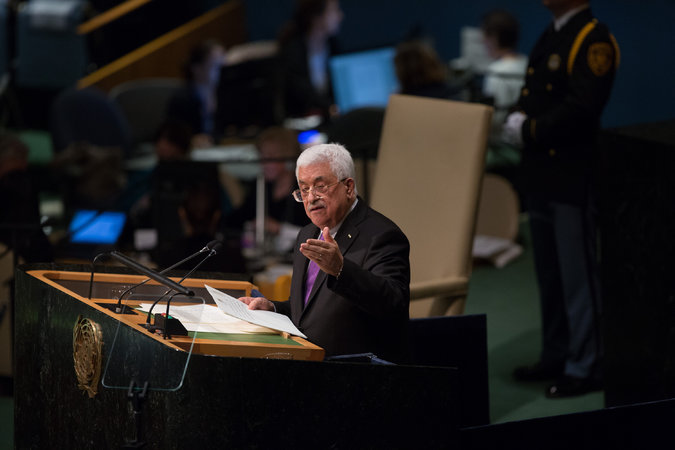Demonstrating a new level of tension withIsrael, President Mahmoud Abbas of thePalestinian Authority declared Wednesday that it was no longer bound by the Oslo Peace Accords and subsequent agreements that formed the basis for a two-state solution to the Israeli-Palestinian conflict.
In his annual General Assembly speech, Mr. Abbas accused Israel of having violated the accords and subsequent agreements that outline security, economic and other arrangements. He asserted that there was no reason that thePalestinians should remain faithful to them as long as the Israelis were not.
“We cannot continue to be bound by these signed agreements with Israel and Israel must assume fully all its responsibility as an occupying power,” Mr. Abbas said.
There was no immediate reaction from the Israeli government. Officials said they were studying Mr. Abbas’s speech.
There had been speculation fed by Mr. Abbas’s aides that he would drop a “bombshell” announcement in his speech. While the announcement sounded serious, the practical effects were not immediately clear.
Khalil Shikaki, a leading Palestinian political analyst, said Mr. Abbas’s declaration was “a big deal, no doubt” but would mean “absolutely nothing” on the ground “until he starts taking the steps he mentioned” to curtail security, economic, and civil coordination between Israel and the Palestinian Authority. He said Mr. Abbas would be under tremendous pressure from Palestinians to cut these ties but would probably take weeks or months to follow through.
Mr. Abbas delivered his speech against a backdrop of growing frustration among many Palestinians over the paralysis in peace negotiations with Israel, the most protracted conflict vexing the United Nations since its founding 70 years ago.
His own popularity within the Palestinian diaspora has suffered as a result.
With peace talks going nowhere, Mr. Abbas has moved over the past three years to seek international recognition of Palestinian statehood in a strategy to pressure Israel.
At the United Nations, members voted overwhelmingly to upgrade the Palestinian delegation to nonmember observer state status in 2012.
Since then the Palestinians have used that status to attain voting rights in other United Nations agencies and to join the International Criminal Court, where they have threatened to seek war-crimes prosecutions against Israel as the occupying power on Palestinian lands.
Less than three weeks ago the General Assembly voted overwhelmingly to allow the Palestinians to fly their national flag at the United Nations headquarters — a symbolic step that nonetheless angered the Israelis, who called it a cynical gesture that would do nothing to advance the peace process.
Last year Mr. Abbas used his General Assembly speech to push for a Security Council resolution that would demand an end to Israel’s occupation of Palestinian territory by a certain date, and define a Palestinian state roughly along the pre-1967 lines with East Jerusalem as its capital.
But the momentum for such a resolution has faded with the world’s increasing focus on fighting the Islamic State and grappling with the world refugee crisis.
Mr. Abbas had given a foretaste of his General Assembly speech in anopinion piece published Tuesday on The Huffington Post website, in which Mr. Abbas placed responsibility for the failure of negotiations entirely with the Israelis.
“While the Israeli government pays lip service to the two-state solution internationally, domestically it employs policies aimed at destroying what’s left of Palestine,” he wrote.
The Israeli government has long contended that it is willing to re-engage in peace talks with the Palestinians and has argued that Mr. Abbas has poisoned the atmosphere by inciting Palestinian attacks against Israel.














